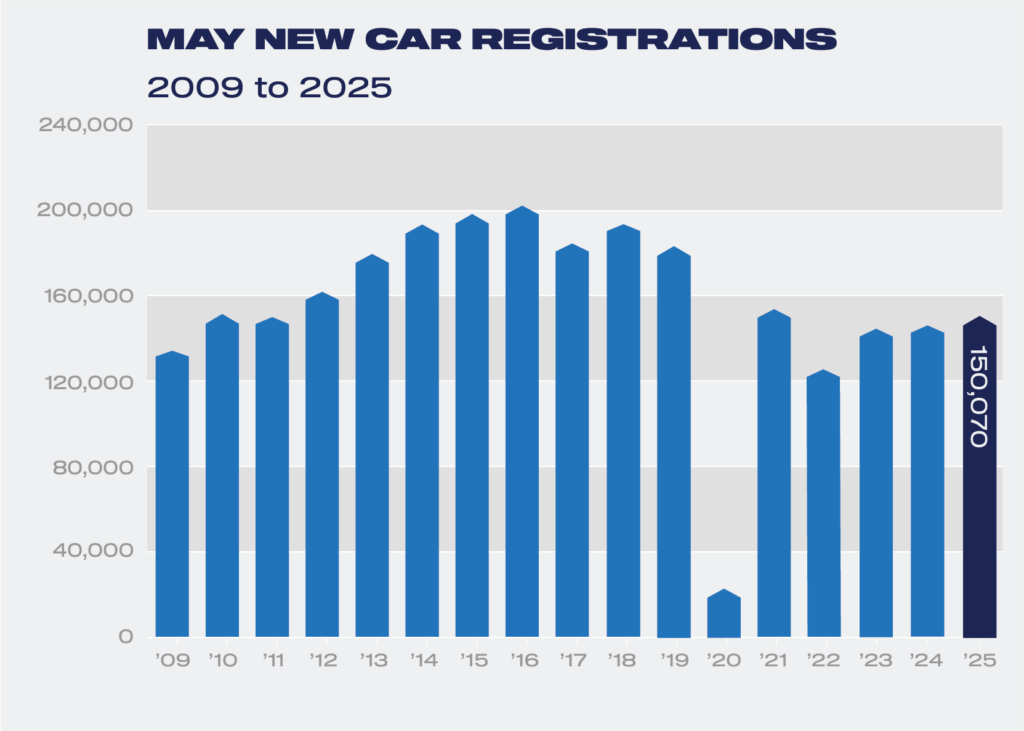London, June 05, 2025 , (Oilandgaspress) –––The UK’s new car market returned to growth in May, as registrations rose 1.6% to 150,070 units, according to the latest data published today by the Society of Motor Manufacturers and Traders (SMMT). It was the best May performance since 2021, but still -18.3% lower than in pre-pandemic 2019 and only the second month of growth this year, reflecting brittle consumer confidence and economic turbulence.

| May | |||||
|---|---|---|---|---|---|
| 2025 | 2024 | % change | Mkt share ’25 | Mkt share ’24 | |
| PRIVATE | 56,131 | 57,453 | -2.3% | 37.4% | 38.9% |
| FLEET | 90,102 | 86,871 | 3.7% | 60.0% | 58.8% |
| BUSINESS | 3,837 | 3,354 | 14.4% | 2.6% | 2.3% |
| 150,070 | 147,678 | 1.6% |
Fleets and businesses drove the growth, up 3.7% and 14.4% respectively and responsible for 62.6% of registrations, while interest from private buyers fell for the second consecutive month, down -2.3%. There were double digit declines in deliveries of both petrol and diesel cars – down -12.5% and -15.5% – while demand for the latest electrified models increased dramatically to take a combined 47.3% market share.
May car registration by fuel
2025 car registrations by fuel
| May | |||||
|---|---|---|---|---|---|
| 2025 | 2024 | % change | Mkt share ’25 | Mkt share ’24 | |
| BEV | 32,738 | 26,031 | 25.8% | 21.8% | 17.6% |
| PHEV | 17,898 | 11,866 | 50.8% | 11.9% | 8.0% |
| HEV | 20,351 | 19,053 | 6.8% | 13.6% | 12.9% |
| PETROL | 71,291 | 81,508 | -12.5% | 47.5% | 55.2% |
| DIESEL | 7,792 | 9,220 | -15.5% | 5.2% | 6.2% |
| TOTAL | 150,070 | 147,678 | 1.6% |
Uptake of hybrid electric vehicles (HEVs) grew by 6.8% to 20,351 units, while plug-in hybrid electric vehicles (PHEVs) were up more than half (50.8%) to 17,898. Registrations of battery electric vehicles (BEVs), meanwhile, rose by 25.8%, accounting for 21.8% of the market as manufacturers continued to support sales with attractive incentives.
Despite this, BEV registrations year-to-date have only reached 20.9% market share – still seven percentage points off the 28% mandated by regulation. Moreover, significant discounting is still ongoing despite new model introductions and increasingly affordable offerings. While recent adjustments to the ZEV Mandate were welcome, the current market situation is unsustainable for a sector already facing multiple cost pressures.

Manufacturers are investing billions to deliver zero emission mobility for all, and consumers are responding but not in the volumes needed – so industry calls on government to match this commitment with fiscal incentives. Halving VAT on new EV purchases would put 267,000 additional new EVs – rather than fossil fuel vehicles – on the road in the next three years and drive down CO2 emissions by six million tonnes a year. Removing EVs from the VED Expensive Car Supplement, meanwhile, and equalising VAT paid on public charging to that levied at home would send a signal that now is the time to switch.
Information Source: Read More
Oil and Gas, Wind, Biomass, Sustainability, Oil Price, LPG, Solar, Marine, Aviation, Fuel, Hydrogen, Electric ,EV, Gas, oil and gas




